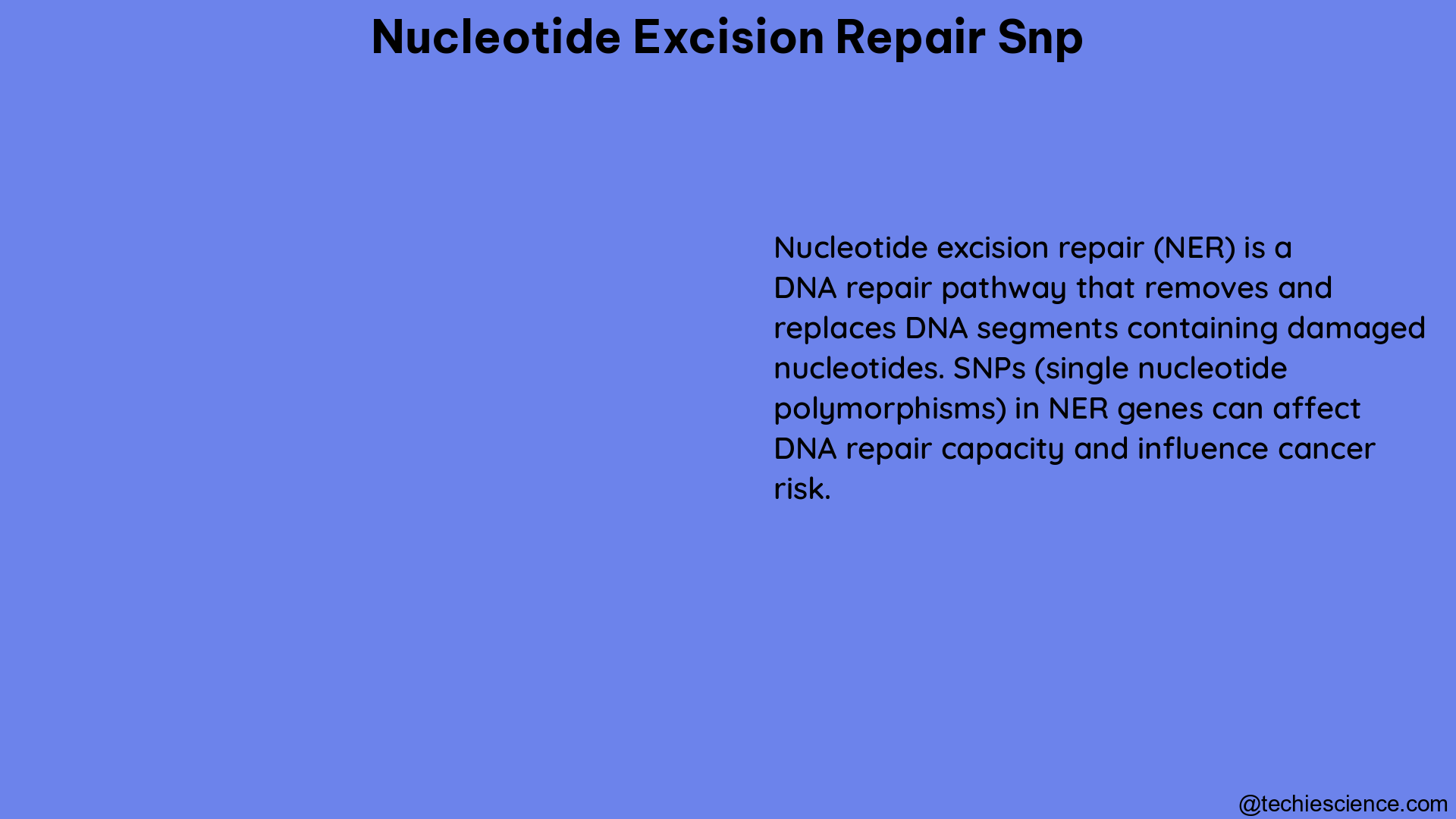Nucleotide excision repair (NER) is a crucial DNA repair mechanism that removes bulky DNA adducts and restores the canonical nucleotide sequence. NER has been associated with various types of cancer, including breast, ovarian, and colorectal cancer, due to its role in removing DNA damage caused by mutagens and carcinogens. Single nucleotide polymorphisms (SNPs) in NER genes have been shown to affect DNA repair efficiency and contribute to the development of cancer.
Understanding the Significance of NER SNPs
Genetic Variants and DNA Damage
Genetic variants of NER genes have been found to be associated with DNA damage caused by exposure to mutagens and carcinogens. A study published in the Cancer Epidemiology, Biomarkers & Prevention journal investigated the relationship between genetic variants of NER genes and DNA damage. The researchers analyzed 15 SNPs in seven NER genes (XPC, XPD, XPF, XPG, ERCC1, CCNH, and CDK7) and found that several SNPs were significantly associated with increased DNA damage levels, as measured by the comet assay. For instance, the XPD Lys751Gln (rs13181) and XPC Ala499Val (rs2228000) polymorphisms were associated with higher levels of DNA damage, suggesting that these genetic variants may impair the efficiency of DNA repair and increase the risk of cancer development.
Quantifying NER Efficiency
Researchers have developed a rapid assay for measuring nucleotide excision repair by oligonucleotide retrieval. This assay can quantify the extent of NER in diverse cell types, including immortalized, primary, and stem-like cells. By using this assay, scientists can assess the impact of NER SNPs on the efficiency of DNA repair. For example, a study published in the Nucleic Acids Research journal demonstrated that the oligonucleotide retrieval assay can be used to measure NER activity in various cell lines, including human fibroblasts, HeLa cells, and mouse embryonic stem cells. This tool can be valuable in understanding the functional consequences of NER SNPs and their contribution to cancer development.
NER Deficiency and Mutational Signatures

NER deficiency has been associated with distinct mutational signatures observed in cancer. A study published in the Genome Research journal analyzed the genome-wide somatic mutational profiles of adult stem cells (ASCs) from NER-deficient Ercc1 −/Δ mice. The researchers found that NER-deficiency increases the base substitution load twofold in liver ASCs but not in small intestinal ASCs, which coincides with the tissue-specific aging pathology observed in these mice. Additionally, NER-deficient ASCs of both tissues showed an increased contribution of Signature 8 mutations, a mutational pattern with unknown etiology that is recurrently observed in various cancer types.
These findings suggest that NER SNPs can lead to NER deficiency, which in turn can influence the mutational landscape of cancer cells. Understanding the relationship between NER SNPs, NER deficiency, and mutational signatures can provide valuable insights into the molecular mechanisms underlying cancer development and progression.
NER SNPs and Cancer Risk
Numerous studies have investigated the association between NER SNPs and cancer risk. A study published in the Cancer Epidemiology, Biomarkers & Prevention journal found that polymorphisms in nucleotide excision repair genes, polycyclic aromatic hydrocarbon-DNA adducts, and breast cancer risk are associated. The researchers analyzed 15 SNPs in seven NER genes and found that several SNPs, such as XPD Lys751Gln (rs13181) and XPC Ala499Val (rs2228000), were significantly associated with an increased risk of breast cancer.
Another study, published in the Carcinogenesis journal, identified significant associations between XPD SNPs and skin, breast, and lung cancers. Interestingly, the researchers found that these associations were observed despite the fact that neither amino acid was highly conserved or in a region of the protein thought to impact function. This suggests that NER SNPs can have complex and unexpected effects on cancer risk, highlighting the need for further investigation.
Tissue-Specific Implications of NER SNPs
The impact of NER SNPs can be tissue-specific, as demonstrated by the study on NER-deficient Ercc1 −/Δ mice. The researchers found that NER-deficiency increased the base substitution load twofold in liver ASCs but not in small intestinal ASCs, coinciding with the tissue-specific aging pathology observed in these mice.
This finding underscores the importance of considering the tissue-specific effects of NER SNPs. Different cell types and tissues may have varying sensitivities to NER deficiency, leading to distinct mutational signatures and cancer susceptibility. Understanding these tissue-specific patterns can help in developing targeted interventions and personalized cancer prevention strategies.
Conclusion
In summary, single nucleotide polymorphisms (SNPs) in nucleotide excision repair (NER) genes have been extensively studied for their impact on DNA repair efficiency, cancer development, mutational signatures, and tissue-specific aging pathology. Researchers have utilized various tools, such as the oligonucleotide retrieval assay, to quantify the extent of NER in diverse cell types and assess the functional consequences of NER SNPs.
The available evidence suggests that NER SNPs can affect DNA repair capacity, leading to increased DNA damage and cancer risk. NER deficiency has also been linked to distinct mutational signatures observed in cancer, highlighting the importance of understanding the molecular mechanisms underlying these associations.
Furthermore, the tissue-specific effects of NER SNPs emphasize the need for a comprehensive and personalized approach to cancer prevention and treatment. By unraveling the complexities of NER SNPs, researchers can pave the way for the development of targeted interventions and improved cancer management strategies.
References:
- Genetic Variants of Nucleotide Excision Repair Genes Are Associated with DNA Damage Caused by Exposure to Mutagens and Carcinogens. https://aacrjournals.org/cebp/article/19/1/211/123586/Genetic-Variants-of-Nucleotide-Excision-Repair
- A Rapid Assay for Measuring Nucleotide Excision Repair by Oligonucleotide Retrieval. https://www.ncbi.nlm.nih.gov/pmc/articles/PMC4013936/
- Deficiency of nucleotide excision repair is associated with mutational signature observed in cancer. https://genome.cshlp.org/content/29/7/1067.full.html
- Eukaryotic nucleotide excision repair, from understanding mechanisms to influencing biology. https://www.ncbi.nlm.nih.gov/pmc/articles/PMC2432112/
- Polymorphisms in nucleotide excision repair genes, polycyclic aromatic hydrocarbon-DNA adducts, and breast cancer risk. https://aacrjournals.org/cebp/article/16/10/2033/265524/Polymorphisms-in-Nucleotide-Excision-Repair-Genes
- XPD Polymorphisms: Effects on Cancer Risk. https://www.ncbi.nlm.nih.gov/pmc/articles/PMC2432112/

I am Abdullah Arsalan , Completed my PhD in Biotechnology. I have 7 years of research experience. I have published 6 papers so far in the journals of international repute with an average impact factor of 4.5 and few more are in consideration. I have presented research papers in various national and international conferences. My subject area of interest is biotechnology and biochemistry with special emphasis on Protein chemistry, enzymology, immunology, biophysical techniques and molecular biology.